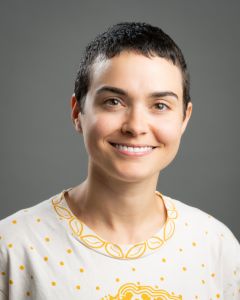About Our Program
The University of Wisconsin Hematology Research Training Program trains MD and PhD candidates to become independent investigators in hematology. The program is tailored to each trainee's career goals, emphasizes multidisciplinary approaches in both basic and clinical research, and provides instruction in the responsible conduct of science.
We strongly encourage underrepresented minorities to apply for pre- and post-doctoral training positions.
This program is funded by a National Institutes of Health (NIH)/National Heart, Lung, and Blood Institute (NHLBI) Kirschstein National Research Service Award (T32 HL07899).
How to Apply
- Requirements
-
Predoctoral positions:
- Admission to a graduate program at the University of Wisconsin-Madison
- Commitment to a laboratory within a PhD or MD-PhD program
- Must be U.S. citizen or permanent resident (green card)
Postdoctoral Positions:
- Possess MD, PhD, MD-PhD or equivalent degree
- Commitment to 2 years of training
- Payback obligation incurred during the initial 12 months of support
- Must be U.S. citizen or permanent resident (green card)
- Application Process
-
Send a letter of inquiry describing your career goals, your CV, and the additional materials below to:
John P. Sheehan, MD, Principal Investigator
c/o David Smith
600 Highland Ave. Box: 5669
Madison, WI 53792
Email: dsmith@medicine.wisc.eduAdditional required application materials:
Predoctoral positions:
- Nominating letter from a Training Faculty member
- Brief statement of research interests (1 page)
- GRE or MCAT scores
- Undergraduate and graduate transcripts
Postdoctoral positions:
- Nominating letter from a Training Faculty member
- Letters of recommendation (2)
- Brief statement of research interests/career plan (1-2 pages)
Current Fellows
Post-doctoral trainee
Mentor: Joshua Coon, PhD
Post-doctoral trainee
Mentor: Bill Sugden, PhD
Post-doctoral trainee
Mentor: Daniel Matson, MD, PhD
Pre-doctoral trainee
Mentor: Joshua Coon, PhD
Post-doctoral trainee
Mentor: Christian Capitini, MD
Graduate Success
Leadership
Program Director
Faculty Mentors
- David J. Beebe, MD, PhD, Department of Biomedical Engineering
- Emery Bresnick, PhD, Department of Cell and Regenerative Medicine
- Jason Cantor, PhD, Department of Biochemistry
- Christian Capitini, MD, Department of Pediatrics
- Jane Churpek, MD, Department of Medicine, Division of Hematology, Medical Oncology and Palliative Care
- Joshua Coon, PhD, Department of Biomolecular Chemistry
- Jing Fan, PhD, Department of Nutritional Sciences
- Jacques Galipeau, MD, Department of Medicine, Division of Hematology, Medical Oncology and Palliative Care
- Jenny Gumperz, PhD, Department of Medical Microbiology and Immunology
- Anna Huttenlocher, MD, Department of Pediatrics
- Shannon Kenney, MD, Department of Human Oncology and Department of Medicine
- Bruce Klein, MD, Departments of Pediatrics, Medicine and Medical Microbiology and Immunology
- Bo Liu, PhD, Department of Cell and Regenerative Biology
- Ryan Mattison, MD, Department of Medicine, Division of Hematology, Medical Oncology and Palliative Care
- Jeniel Nett, MD, PhD, Department of Medicine, Division of Infectious Disease
- Lixin Rui, PhD, Department of Medicine, Division of Hematology, Medical Oncology and Palliative Care
- John Sheehan, MD, Department of Medicine, Division of Hematology, Medical Oncology and Palliative Care
- Miriam Shelef, MD, PhD, Department of Medicine, Division of Rheumatology
- Igor Sluvkin, MD, PhD, Department of Pathology
- Paul Sondel, MD, PhD, Department of Pediatrics
- Owen Tamplin, PhD, Department of Cell and Regenerative Biology
- Elizabeth Wright, PhD, Department of Biochemistry
- Jing Zhang, PhD, Department of Human Oncology
Program Details
- Areas of Emphasis
Our program emphasizes pre- and post-doctoral training in vascular biology and hematopoetic stem cells and malignancy. Vascular biology is critically important for human disease, impacting such basic processes as inflammation, the immune response, hemostasis, thrombosis, and metastasis.
We have assembled expertise in cellular and molecular aspects of hemostasis, extracellular matrix biology, vasculogenesis/angiogenesis, cellular mechanisms of inflammation, the genetics of diabetes, lipoprotein metabolism, and clinical aspects if hemophilic and thrombophilic states.
Likewise, hematopoetic stem cells are important to therapeutic approaches in a variety of disease states, and the University of Wisconsin is an internationally recognized leader in embryonic stem cell biology.
We provide the multidisciplinary training required to pursue translational research opportunities, and formal training for clinical investigators.
Clinical trainees may take advantage of the NIH-funded UW Institute for Clinical & Translational Research (ICTR), which provides didactic training in biostatistics, epidemiology, clinical trial design, and practical skills such as scientific and grant writing.
- Individual Development Plan (IDP)
All trainees should complete an Individual Development Plan (IDP). This tool helps you:
- assess your current skills and strengths
- make a plan for developing skills that will help you meet both your academic and professional goals
- communicate with your advisors and mentors about your evolving goals and related skills
- Related Facilities and Programs
Research Facilities:
- Cardiovascular Research Center
- Clinical Research Services and Networks
- Carbone Cancer Center (NCI designated)
- Wisconsin National Primate Research Center (NIH-funded and the only of its kind in the Midwest)
- Wisconsin Institute of Medical Research (WIMR)
Education Programs:





